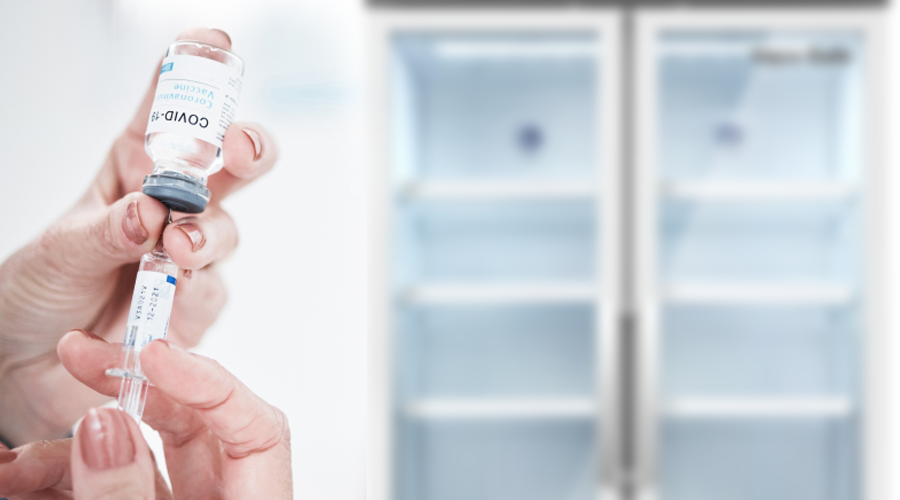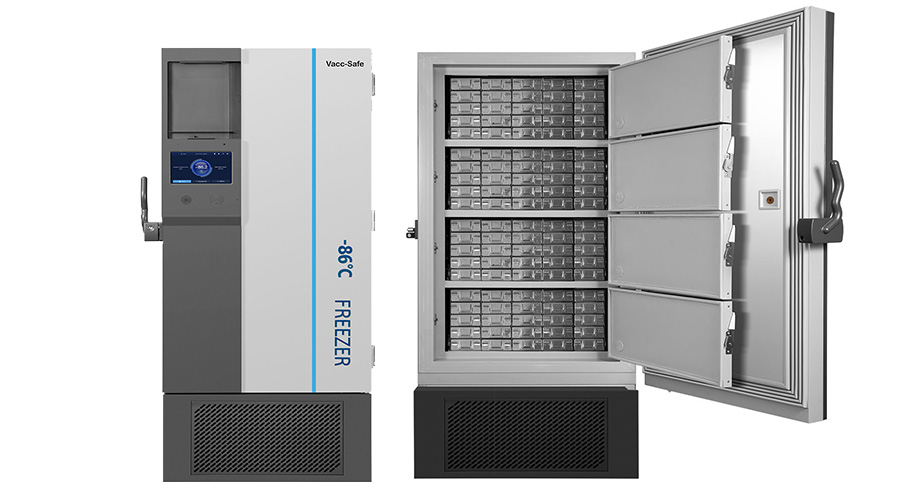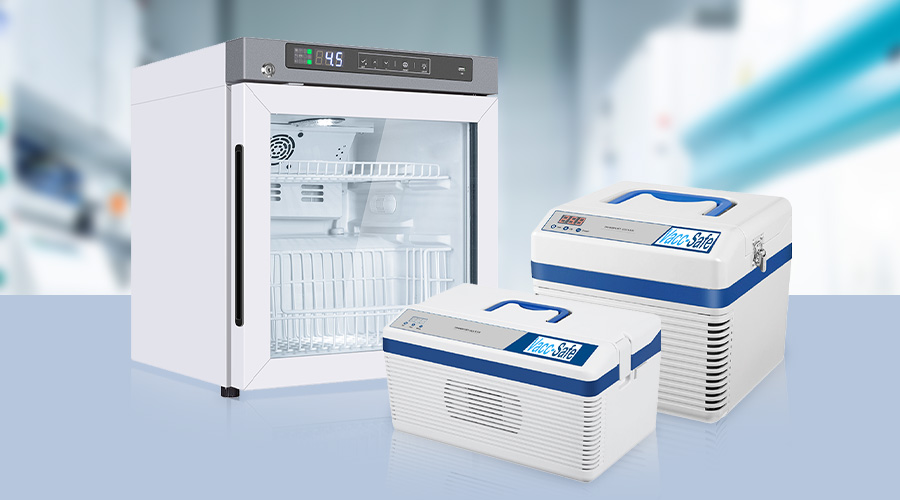When storing sensitive vaccines, it’s important to use the best medical refrigerator available. Modern medical refrigerators are fitted with a range of features to ensure sensitive vaccines remain safe. These include alarms, heated doors, temperature monitoring and inbuilt batteries. When choosing the best refrigerator, consider multiple factors, including your location, door styles, and energy consumption. We also recommend addressing the common mistakes healthcare professionals make when purchasing a refrigerator and the steps you can take to avoid them. Read on to discover how you can confidently choose the best vaccine refrigerator.
What is a Vaccine Refrigerator?
Vaccine refrigerators are specialised medical storage units designed to maintain the precise temperature required to keep vaccines and other medication safe and effective. Vaccines are delicate biological substances that can become less potent or even destroyed if they’re exposed to temperatures beyond +2°C to +8°C. Vaccines are not only sensitive to temperature, but also to direct sunlight and ultraviolet (UV) exposure, which can compromise vaccine effectiveness. This makes the use of specialised vaccine refrigerators incredibly vital.
These refrigerators are specifically designed to maintain the required temperature range of +2°C to +8°C and, unlike household refrigerators, have built-in features to support these optimal conditions. Some of these features include temperature displays, alarms, and data loggers that keep vaccines safe by continuously monitoring their temperature, thus preventing them from losing their potency.
As stated in the National Vaccine Storage Guidelines, all clinics must store their vaccines in a purpose-built refrigerator. Failure to follow these directions may result in legal consequences from the Australian Health Practitioner Regulation Agency (AHPRA). Furthermore, if you administer a vaccine that has not been sufficiently monitored to a patient, you may face a medical negligence claim for failing duty of care.
Features of Vaccine Refrigerators
In support of maintaining their desired temperature range, vaccine refrigerators are fitted with a range of features to keep our vaccines between +2°C and +8°C. The following features are integral for successful vaccine storage:
Controlling of temperature
Maintaining a consistent temperature is critical for successful vaccine storage. In order to maintain the +2°C to +8°C range needed, refrigerators are fitted with an advanced cooling system that distributes air evenly to prevent hot or cold spots. Modern vaccine fridges, such as those developed by Vacc-Safe, are also fitted with top cooling units that create air curtains to prevent outside heat from entering when the door is open.
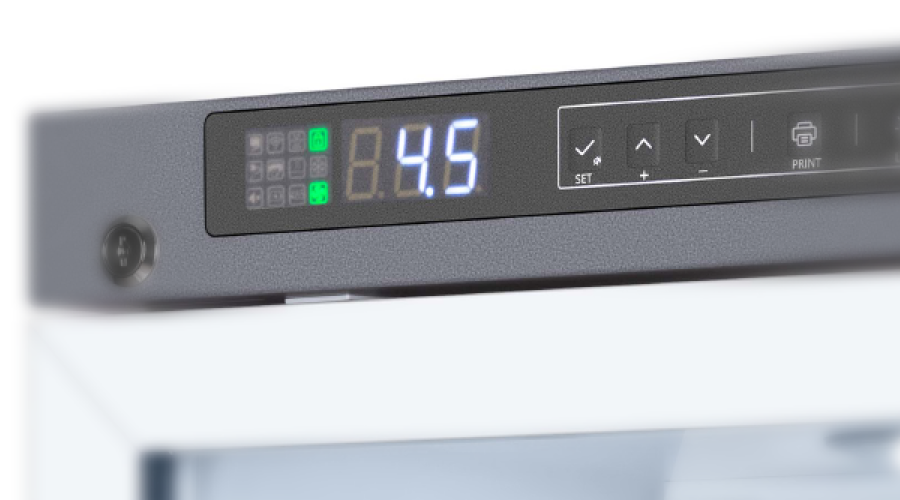
Monitoring temperature
Vaccine refrigerators are also designed to allow healthcare workers to actively monitor temperature. Wireless data loggers and integrated thermometers record temperature data at regular intervals, which can be exported to an external device or USB flash drive. Accurate temperature recording is essential for compliance and quality assurance. It’s important to invest in a refrigerator that can display current, minimum, and maximum temperatures.
Interior Light
Since healthcare workers aim to minimise door-open times to protect internal temperature, interior lighting helps staff quickly locate and retrieve vaccines. This reduces the amount of time the door stays open, helping preserve consistent temperatures.
Lockable doors that are self-closing
With expensive, sensitive material such as vaccines, there should be a heightened level of security. All medical refrigerators should come with a locking system, preventing untrained personnel from accessing them. Locks can include keys, PINs, or passwords. Your refrigerator door should also be self-closing to further protect against potential vaccine losses.
Fan assistance
Fan-assistance features ensure that air is circulated throughout the unit, which helps to maintain a consistent, uniform temperature. Fans prevent hot or cold spots common in household refrigerators, particularly in areas more prone to fluctuations, such as near the door or shelves.
Glass & Heated doors
Having a glass door is another vital feature. When paired with an interior light, a glass door offers clear storage visibility, reducing temperature losses during prolonged door openings. Furthermore, for greater temperature stability, vaccine refrigerators typically feature heated doors that prevent condensation and icing from compromising insulation.
Alarms
It is important to be aware of any temperature changes, with even minimal fluctuations potentially ruining your vaccine’s potency. Therefore, vaccine refrigerators should be fitted with alarm systems that immediately alert healthcare professionals to any temperature variations. Alarms may include audible signals, visual alerts, or remote notifications.
In-built battery
If any power outages were to occur, modern vaccine refrigerators can be fitted with an in-built battery supply to keep running. A refrigerator without this built-in feature would last for less than 30 minutes before the temperature becomes unsafe for storage. Power interruptions can occur without warning, so selecting a unit with battery backup ensures continuous protection for your vaccine supply.
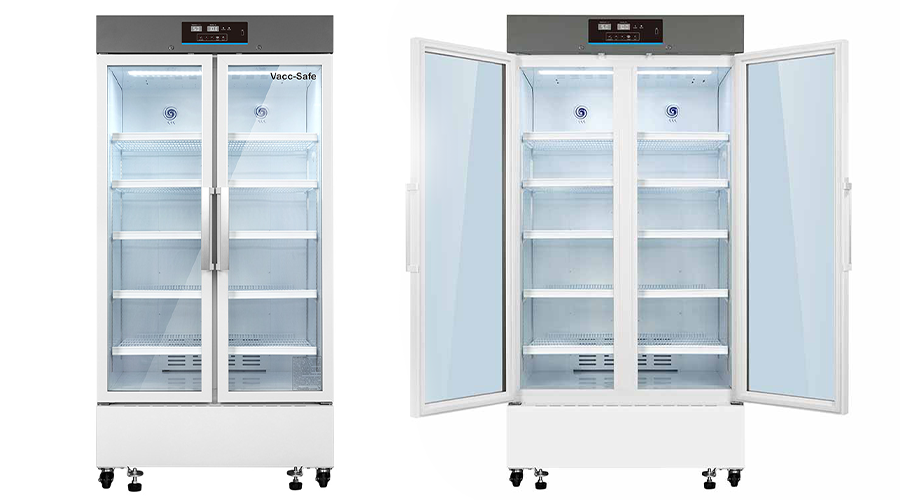
How to Choose the Best Vaccine Refrigerator
When choosing the best vaccine refrigerator for you, we recommend addressing the following factors:
Fit for purpose – Industry and use of the fridge.
Firstly, you should understand the specific purpose of your refrigerator and the features to best suit the needs of your health facility. For instance, you may be an immunisation clinic with a high vaccine turnover, requiring you to prioritise models with glass doors, such as the Vacc-Safe Essential Refrigerator, to speed up identification and improve storage management. If you’re storing vaccines in a Pharmaceutical laboratory that requires heightened security, you may prioritise a refrigerator with self-closing doors, locks, and alarms.
Where will the fridge be located?
Choosing the right fridge for your placement location will be critical. It’s always wise to evaluate your available space to ensure your fridge will fit comfortably. Remember, vaccine refrigerators need extra room for air circulation to function properly. If you’re working in a mobile clinic or a small rural health centre with limited space, choosing an underbench-unit can be a smart decision, as these models are designed to fit conveniently under work surfaces and perform well in compact environments. Otherwise, if you have space flexibility, a larger, standalone refrigerator would be ideal.
Storage capacity in the fridge and size for the need
Every facility will have unique storage requirements, based on the type and volume of vaccines they administer. Furthermore, the number of patients served and the seasonality of vaccines will all influence a facility’s storage needs. If you are unsure about what size refrigerator is right for you, please refer to our guide below:
- Smaller clinics (General Practitioner and Community Pharmacies) – These facilities can typically operate with a smaller, compact vaccine refrigerator, which will be great for limited space and smaller stock levels.
- Medium-sized facilities (Immunisation Clinic, Urgent Care Centres, Community Health Clinics) – With larger patient volumes, medium-sized vaccine refrigerators will be viable, with enough space to store a broader range of vaccines without taking up a lot of space.
- Laboratory (Research Labs, University Medical Labs, Clinical Trials) – Medium-sized refrigerators are typically ideal for most labs, while larger laboratories may need higher-capacity units to accommodate higher demand for storage.
- Large hospitals (Public or Private) – These facilities will usually require high-capacity refrigerators to store a large volume of vaccines across multiple departments.
Energy Consumption
Your vaccine refrigerator’s energy consumption (usually measured in kilowatt-hours (kWh)) is a crucial factor because it directly impacts your facility’s operational costs and environmental footprint. Opting for a more energy-efficient refrigerator can reduce electricity bills and support sustainability efforts. It’s best to consult your manufacturer directly about the energy consumption levels of each model to determine how much power is required for daily operation.
Door Styles
You’ll need to decide between two major door styles: solid or glass doors. Solid doors are excellent for insulation and are especially ideal for storing light-sensitive vaccines by blocking out the sun’s rays. However, if sunlight is not a factor in your facility, particularly in laboratories where environmental variables are tightly controlled, glass doors offer better visibility and convenience.
Hinged vs. Sliding
Most vaccine refrigerators come with hinged doors. This design is preferred due to its ability to create a tight seal, which maintains a more consistent temperature. However, if space is limited, a sliding door could be a better option. Just be aware that sliding doors typically offer less efficient sealing and airflow, as they’re often made from lighter materials, which can result in more frequent temperature fluctuations. You should also ensure that both your hinged and sliding doors are lockable for security and theft prevention.
Temperature control
Maintaining your vaccine’s efficacy should always be your top priority. Choosing a refrigerator with precise temperature control is paramount. Make sure your unit includes key features mentioned earlier, such as fan assistance, forced air circulation, and top cooling units, to help regulate internal conditions reliably.
Logging and tracking
For regulatory compliance and quality assurance, you’ll be required to log minimum and maximum temperatures. Different refrigerators come with different temperature-monitoring options, so it’s important to choose one that suits your facility’s workflow. We recommend selecting a vaccine refrigerator with a built-in min/max thermometer, ideally teamed with an external data logger for added assurance.
Warranty
As with any purchase, you should always check the warranty period provided by your supplier and confirm whether parts and labour are covered. Generally, you should look for a warranty period of at least 2 years on your refrigerator.
What To Avoid When Selecting a Vaccine Refrigerator
When selecting the best vaccine refrigerator for your needs, we recommend avoiding these common mistakes:
Don’t use “household” refrigerators.
Although the cost of a household refrigerator may seem more attractive on paper, it’s important to fully consider the risks and long-term costs. Household refrigerators do not exhibit the level of temperature control of vaccine refrigerators. They are designed, not with storing sensitive vaccines in mind, and don’t have the same level of specialised features, such as fan-forced cooling, alarms or locking mechanisms.
Importantly. You will also violate the National Vaccine Storage Guidelines, which state that “Purpose-built vaccine refrigerators are the only suitable option for vaccine storage.”
Avoid the use of glass-door fridges if your area of work receives direct sunlight.
Vaccines are not only sensitive to temperature, but also to sunlight. While glass-door refrigerators offer convenience, they can also allow light to penetrate and affect the integrity of your vaccine supply. If your work area is exposed to sunlight and the fridge can’t be relocated, consider selecting a refrigerator with a solid, light-blocking door.
Lack of storage and ventilation.
Before purchasing a refrigerator, it’s important to assess your storage requirements to ensure you select the right size. For instance, a smaller pharmacy may not require the same fridge capacity as an inner-city immunisation clinic. Medical refrigerators are measured in litres, with underbench models typically ranging from 50 to 150 litres, with larger units hitting over a 1,000 litres.
Carefully considering your storage needs helps prevent over-stocking, where shelves become overfilled, in addition to doors being unable to close properly due to excessive stock. Over-packing can negatively affect air circulation, causing some vaccines to become too warm and others becoming too cold, potentially ruining their efficacy. If you’re at risk of overcrowding, we strongly recommend choosing a larger model or investing in another refrigerator.
Absence of temperature monitoring and alarms.
Ensure your new refrigerator is equipped with temperature monitoring devices, as well as both audible and visual alarms. While vaccine refrigerators are designed to maintain a temperature range of +2°C to +8°C, these features help protect vaccines from temperature excursions. Temperature monitoring should include either an inbuilt or external, digital data logger as well as a thermometer with minimum and maximum temperature displays. Alarms must be both visual and audible, activating when the temperature falls outside the recommended range.
Although monitoring devices and alarms serve different functions, they work together to ensure vaccine efficacy. Monitoring devices track temperature changes, while alarms provide immediate alerts if those changes exceed safe limits. Importantly, any absence of alarms or temperature monitoring represents a failure to adhere to the National Vaccine Storage Guidelines which explicitly state “each refrigerator must have an audible alarm,” and “all vaccine refrigerators must have a basic data logger and thermometer to continuously monitor refrigerator temperatures.”
At Vacc-Safe, all our refrigerators come fully equipped with visual and audible alarms, safety locks, and high-accuracy LED temperature displays, so you can store vaccines with confidence.
Non-servicing
Once you’ve selected your vaccine refrigerator, you will need to maintain your servicing requirements. The National Vaccine Storage Guidelines outline that you must have your refrigerator serviced every 12 months to ensure it’s still working at a correct level. It will be important to maintain all documentation and records of previous maintenance, with your service carried out by a refrigeration technician.
Choosing a vaccine refrigerator for your facility is one of the most important decisions you will make. An effective refrigerator not only protects your vaccines from unstable temperatures, but it also ensures that they remain safe and secure. By following our guide, you can understand the important factors in your refrigerator decision and the mistakes you should avoid.
The friendly team at Vacc-Safe are Australia’s leading medical storage manufacturer, and will be happy to help you with choosing the right refrigerator for your healthcare needs. Please visit our contact page for more information.
